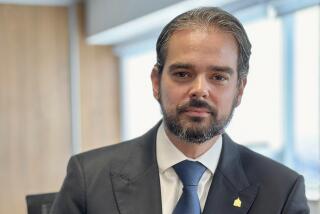Russia Rejects Annan’s Pick for Arms Inspector in Iraq
- Share via
UNITED NATIONS — After four weeks of deadlock, Secretary-General Kofi Annan said Monday that the best person to be chief U.N. weapons inspector for Iraq is Swedish diplomat Rolf Ekeus, who led a U.N. inspection team there from 1991 to 1997.
But Russia rejected Annan’s choice Monday night, casting Ekeus’ nomination into doubt. Russian Ambassador Sergei V. Lavrov sent a formal letter to the president of the Security Council, U.S. Ambassador Richard Holbrooke, saying Moscow “cannot agree with the proposal in the absence of consensus among council members on this issue.” Consultations will resume today.
Annan’s nomination of Ekeus was an attempt to end a month of squabbling among the Security Council’s five permanent members over who should lead the new group in charge of disarming Iraq. The nomination deadline passed Sunday night.
“Over 30 days, he raised something like 25 names, and he could not find one on which all could agree,” said U.N. spokesman Fred Eckhard. “So he put forward the name of the person he thought best for the job.”
Russia and China told Annan on Friday that they opposed Ekeus’ nomination to be executive chairman of the U.N. Monitoring, Verification and Inspection Commission, or UNMOVIC, arguing that he wouldn’t be acceptable to Iraq. France also has voiced opposition, but the U.S. and Britain applauded the choice.
Russia, China and France favor Brazil’s former U.N. ambassador, Celso L.N. Amorim, because he represents a developing country and seems to be able to work well with Iraq, said Chen Renfang, a spokesman for China. The U.S. has called him “unqualified.” Another top candidate is Pasi Patokallio, Finland’s ambassador to Israel and Cyprus.
But Iraq says that it rejects the resolution that created the inspection team, no matter who might lead it. Baghdad charges that the previous inspection group shared its information with Western intelligence agencies and harbored spies.
“It is not a question of who is nominated,” said Iraq’s ambassador to the U.N., Saeed Hasan, after the announcement. “The whole resolution is unfair and unimplementable. We will not deal with it.”
The Security Council created the agency Dec. 17 to replace the U.N. Special Commission, or UNSCOM, which was established after the 1991 Persian Gulf War to find and destroy Iraq’s weapons of mass destruction. Iraq must cooperate with the new team and allow it free access for inspections to have crippling sanctions suspended. One of the new chairman’s first tasks will be to draw up a list of disarmament goals for Baghdad.
No one, asserts Annan, knows the ground better than Ekeus, who arrived in postwar Iraq in 1991 to begin dismantling the country’s weapons systems. Ekeus stepped down in 1997 to become Sweden’s ambassador to the United States. He planned to retire this summer, but Annan approached him in late December about returning to the Iraq post. Ekeus is said to have agreed only if the U.N. could find no one else.
Ekeus has been Annan’s favorite from the beginning of the search.
Under Ekeus, UNSCOM had set up an extensive, high-tech monitoring system to prevent Iraq from producing nuclear, biological and chemical weapons. More than 170 remote-controlled cameras and “sniffer” sensors were installed at 150 sites inside Iraq, and 82 nuclear arms facilities were dismantled. UNSCOM also disabled biological weapons manufacturing plants and destroyed chemical arms.
UNSCOM inspectors pulled out of Baghdad in December 1998 ahead of U.S. and British airstrikes, and were not allowed to return. UNMOVIC is the U.N.’s attempt to restart relations with Iraq with a clean slate.
Russia’s veto of Ekeus means that the council returns to a selection process without a formal deadline. “My only concern is that people don’t show more flexibility on this. It means they don’t really want someone to go into Iraq,” said a Western diplomat. “And then, what is the point of this?”
Critics say that a stalemate is perhaps the best outcome for both the U.S., which wants an inspector with real independence, and for Iraq, which doesn’t want one at all.
“The ideal for the U.S. is an impasse for which Iraq is responsible, so we can point fingers and continue sanctions,” said Daniel L. Byman, a Washington-based analyst at Rand Corp. of Santa Monica. “If the sanctions are strong, Iraq’s programs will be hindered more than they would be if there were inspectors there with no independence.”
More to Read
Sign up for Essential California
The most important California stories and recommendations in your inbox every morning.
You may occasionally receive promotional content from the Los Angeles Times.












